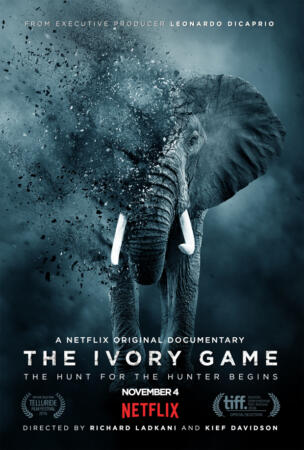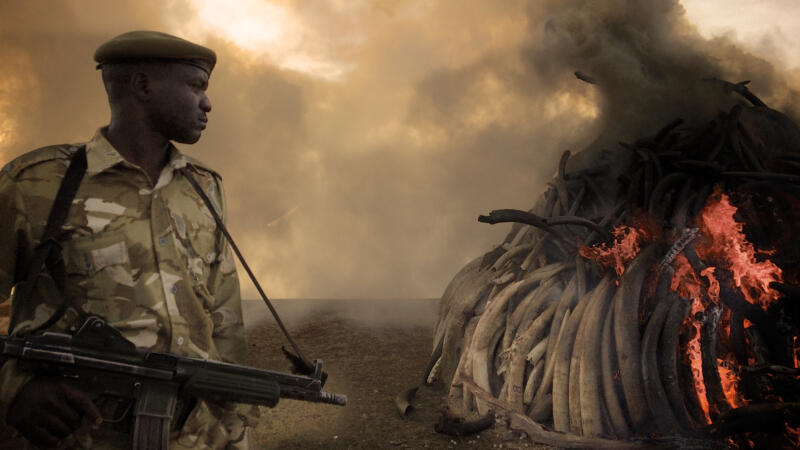
Continuing to build on its award-winning slate of documentary programming, Netflix, the world’s leading Internet TV network, presents “The Ivory Game,” from directors Richard Ladkani and Kief Davidson – an epic documentary feature that takes audiences to the frontlines of the fight to end elephant extinction across continental Africa, in an undercover investigation into the sinister underbelly of ivory trafficking across continents.
An ensemble effort, award-winning director Richard Ladkani and Academy Award–nominated director Kief Davidson filmed undercover for 16 months with a crack team of intelligence operatives, undercover activists, passionate frontline rangers and tough-as-nails conservationists, to infiltrate the corrupt global network of ivory trafficking. A production from Terra Mater Film Studios and Vulcan Productions, the film, unfolding like an international thriller, with impressive photography, follows poachers in pursuit of the so-called “white gold” that is ivory. Time is running out for these African elephants, dangerously nearing closer and closer to extinction.
The question at the heart of “The Ivory Game” is, what have we become if everything we value, everything we care about, we consume? The gripping and urgent documentary thriller unveils the global crisis faced by African elephants, slaughtered by poachers for ivory tusks sold on the international black market to dealers and private collectors. At stake is nothing less than the eventual end of the greatest land mammal on earth, an indelible symbol of wildlife in Africa and an iconic figure of the natural world.
Thousands of African elephants are slaughtered each year to feed the global ivory trade. Most alarming of all, traders in ivory actively pursue the extinction of elephants — the fewer the elephants, the greater demand for their tusks, the more money traders make. Hundreds of tons of illegal ivory are shipped into Mainland China annually through transit hubs such as Vietnam, Thailand and Hong Kong. The ivory is then laundered by Chinese dealers into legal ivory through the issue of fake government certificates fueling an out‐of‐control black market trade.
So intense is the demand for ivory in China that illegal markets flourish — one 15‐kilogram tusk worth $150 in Tanzania can fetch upwards of $300K on the Chinese market once painted, polished or carved. This is a serious business and a ruthless machine; while ivory traffickers control security officers and bribe government officials across the globe, activists, conservationists and whistleblowers (like WildLeaks, an organization depicted in “The Ivory Game”) work in tandem against the clock from disparate corners of the world to stop the killing in Africa and halt the shipping of tusks abroad.
An international consortium of disparate foot soldiers work together to take down poachers and traffickers through drone surveillance, conservation fundraising, undercover sting operations, syndicate busting, fence building tusk burning, and the hardest task of all, legislation. Only recently have governments and international bodies begun to rally to their cause. It is estimated that only 400,000 elephants remain across continental Africa. The Great Elephant Census, the first‐ever pan‐African survey of savanna elephants, was launched in 2013 by philanthropist (and “Ivory Game” executive producer) Paul G. Allen and Elephants Without Borders in an effort to accurately determine the number and distribution of elephants across 18 countries and 463,000 kilometers. The census confirms massive population declines and possible local extinction in the Democratic Republic of the Congo, Cameroon and southwest Zambia.

Elephant populations overall declined by 30 percent (equal to 144,000 elephants) between 2007 and 2014. The current rate of decline is 8 percent per year, primarily due to poaching. In contrast, South Africa, Botswana, Uganda, parts of Kenya, Zambia, Zimbabwe, Malawi and protected areas that span Benin, Niger and Burkina Faso were found to have stable or slightly increasing elephant populations. In the 18 countries surveyed, 352, 271 elephants were counted. This represents 93 percent of savanna elephants in these countries. While change is happening, the fight continues. An elephant is still killed every 15 minutes…
“The Ivory Game” is a real‐life espionage thriller replete with shadowy villains, globetrotting intrigue and heart‐stopping ambushes. It’s a documentary feature designed to inspire both outrage and hope, marking a turning point in mankind’s relationship with wildlife.
The docu-thriller has been successfully screened at top film festivals like Toronto and Telluride, and was honored at the Bristol Wildscreen Festival with the renowned WWF Golden Panda Award.
“The Ivory Game” was produced by Red Bull’s Terra Mater Factual Studios in association with Microsoft co-founder Paul Allen’s Vulcan Productions and Leonardo DiCaprio’s company Appian Way.
Lisa Nishimura, Netflix VP of Original Documentary Programming said, “The breadth of our slate… speaks to Netflix’s continued celebration of diverse voices and styles in the world of nonfiction. We are committed to pushing the boundaries of the documentary form, and our films… represent both emerging talent and iconic filmmakers during a thrilling time for documentaries.”
Netflix also recently released Ava DuVernay’s awards contender “13th,” a searing look at the history of racial injustice in the U.S., which was the first ever nonfiction film to premiere opening night of the New York Film Festival.
Last year, Netflix saw two of its documentary titles, “What Happened, Miss Simone?” and “Winter on Fire,” compete in the Oscar race following successful festival runs. Netflix’s first original documentary acquisition, “The Square,” received a Documentary Feature Academy Award nomination in 2013.
“The Ivory Game” is now streaming on Netflix .
A trailer for the critically-acclaimed documentary is embedded below:
